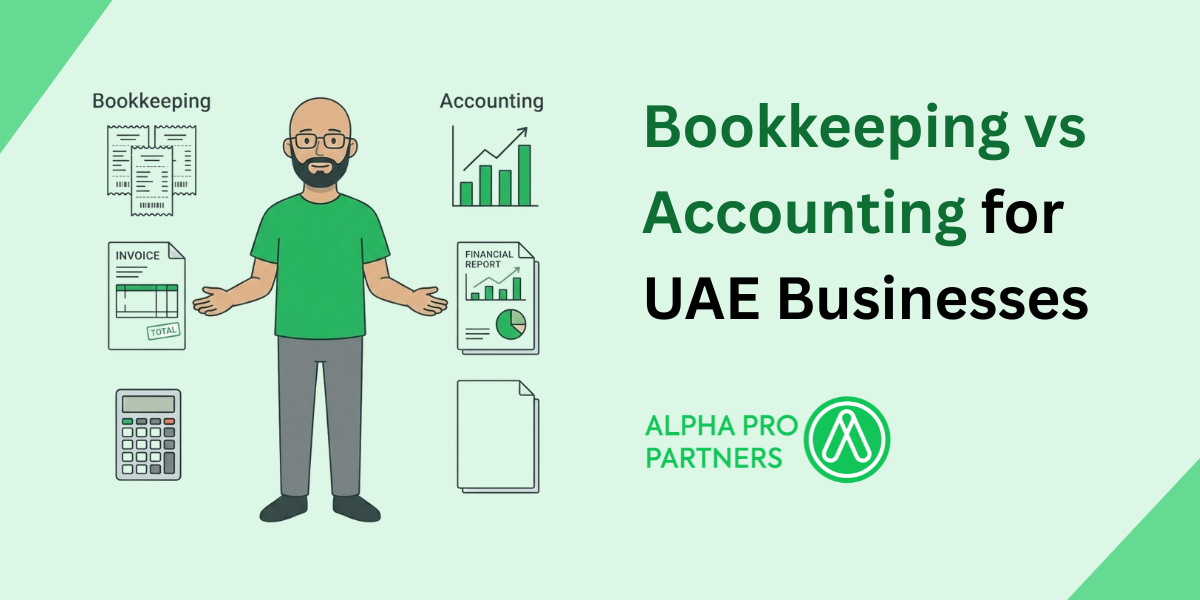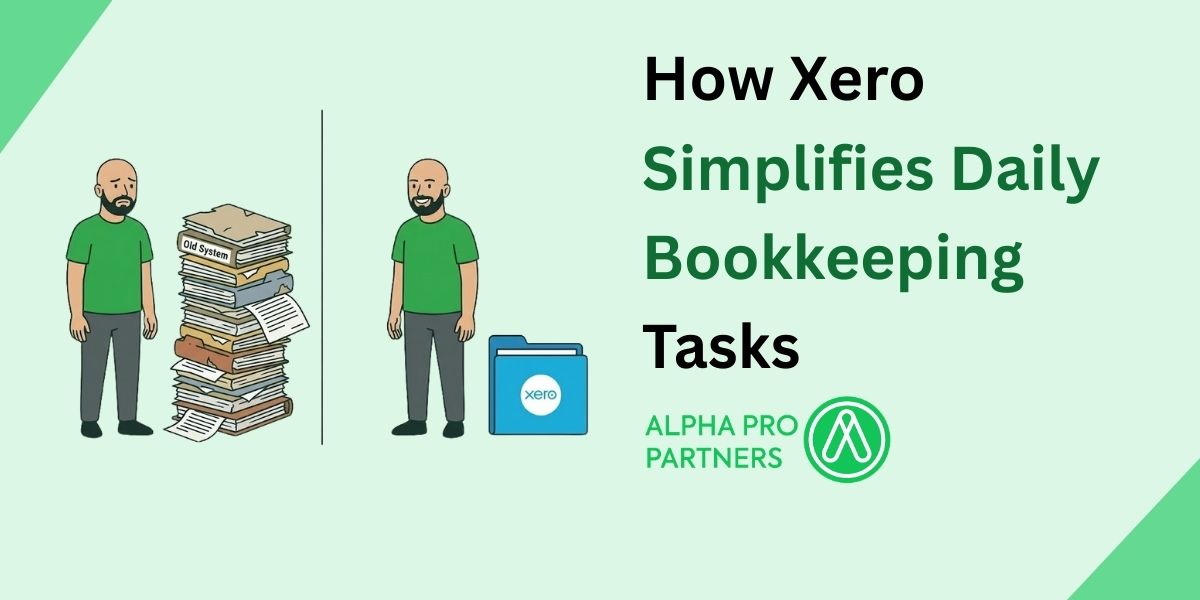What Is Financial Accounting? A Simple Guide for UAE Entrepreneurs

Financial accounting can feel intimidating, but it’s really just about knowing where your money is going and what story your numbers are telling. If you’re running a business in the UAE, understanding financial accounting isn’t just a good idea, it’s essential. Whether you’re dealing with investors, planning for growth, or just trying to stay compliant, the right financial data makes everything easier.
In this guide, our team at Alpha Pro Partners walks you through what financial accounting really means, why it matters, and how it can help you run a better, stronger business.
Why Financial Accounting Exists
At its core, financial accounting helps businesses track, summarise, and report all financial activities over a given period. The goal? To provide a clear and consistent snapshot of how the business is performing financially.
These reports aren't just for you as the business owner. They're also important for investors, creditors, banks, tax authorities, and regulators. Everyone wants to know: Is this business profitable? Is it growing? Can it pay its debts?
The main reports used in financial accounting include:
- Profit and Loss Statement (P&L)
- Balance Sheet
- Cash Flow Statement
- Statement of Changes in Equity
These are the tools that tell the story of your business in numbers.
Why It Matters to UAE Businesses
In a market as competitive as the UAE, businesses need to be strategic. That starts with understanding your finances.
With solid financial accounting:
- You’ll know exactly how much profit you’re making
- You can plan ahead and set smart budgets
- You’ll stay compliant with UAE tax laws (like corporate tax and VAT)
- You’ll look credible to investors, banks, and partners
Plus, accurate financial data makes business decisions way easier—from hiring and expansion to pricing and cash flow planning.

How Financial Accounting Works
Financial accounting follows a process to ensure consistency and accuracy. This is often called the accounting cycle and includes:
Step 1: Recording Transactions
Everything starts with tracking income and expenses. These are logged in journals based on source documents like invoices, receipts, and contracts.
Step 2: Posting to the Ledger
The transactions are then sorted and grouped by account in the general ledger. Think of it as a big notebook showing all your income, expenses, assets, and liabilities.
Step 3: Creating a Trial Balance
At the end of a period (monthly, quarterly, yearly), a trial balance is created to make sure the books are balanced.
Step 4: Adjusting Entries
This step corrects any missing or incomplete data, such as prepaid expenses or accrued income.
Step 5: Preparing Final Statements
The final step is preparing the P&L, balance sheet, and cash flow statement. These documents are then used by stakeholders to assess the company’s financial health.

Key Principles Financial Accounting Follows
Financial accounting is based on a few fundamental rules and assumptions. These principles ensure that data is comparable, consistent, and meaningful across different companies.
Accrual Basis vs Cash Basis
Most UAE businesses that want to grow use the accrual basis. This means revenue and expenses are recorded when they are earned or incurred—not when cash changes hands.
The cash basis, on the other hand, only records transactions when money is received or paid. It’s simple but not as accurate over the long term.
Matching Principle
This rule says you should match expenses with the revenue they helped generate. For example, if you spent AED 10,000 on marketing in January and that brought in sales in February, the cost should be recorded alongside that income.
Conservatism
Be cautious. Record expected losses right away, but only record profits when they are actually earned. It’s about not overstating your success.
Materiality
If a financial detail could influence a decision, include it. If it’s minor, like rounding differences, you can skip it. Use judgement.
Consistency
Stick to the same accounting methods from one period to the next. This helps others trust and understand your data.

Financial Accounting vs Tax Accounting
Both deal with money, but they serve different purposes.
- Financial accounting is used to inform business owners, investors, and banks about performance. It follows international standards like IFRS.
- Tax accounting is used for filing taxes and follows UAE tax laws and rules.
You may report one set of numbers to your board and another to the FTA—and that’s okay, as long as both follow the rules for their purpose.
Who Uses Financial Accounting
Investors
They want to know if your business is worth investing in. They look at earnings, assets, and growth potential.
Banks and Lenders
They use your financial statements to assess if you're creditworthy.
Government and Regulators
They want to make sure you’re paying the right taxes and following reporting laws.
Your Own Team
Your management team needs accurate reports to plan hiring, forecast budgets, and decide what’s next.
How Financial Statements Help You Run a Smarter Business
- P&L Statement: Tells you whether your business is making money or losing it
- Balance Sheet: Shows what you own (assets), what you owe (liabilities), and what’s left over (equity)
- Cash Flow Statement: Helps you manage liquidity and stay on top of payments
- Statement of Changes in Equity: Tracks how your company’s value is shifting over time
When used correctly, these documents aren’t just compliance tools—they’re decision-making tools.
Bringing It All Together
Financial accounting is more than just rules and reports. It’s the system that keeps your business financially healthy, accountable, and future-ready. It builds confidence with investors, ensures your numbers are audit-ready, and helps you understand where your business stands at any moment.
If you're running a business in the UAE and need help making sense of your financials, our team at Alpha Pro Partners is here to guide you. We help you stay compliant, make smarter decisions, and grow with confidence.
FAQs
What is financial accounting in simple terms?
It’s how a business records and reports its financial activities over time using structured reports like the P&L, balance sheet, and cash flow statement.
How is financial accounting different from bookkeeping?
Bookkeeping is the data entry part. Financial accounting takes that data and turns it into reports you can use to make decisions.
What’s the main goal of financial accounting?
To show how your business is performing financially so that others (like investors or lenders) can trust and understand your numbers.
Is financial accounting required in the UAE?
Yes. With corporate tax and VAT now in place, maintaining accurate financial records is not optional.
Which accounting software works best for UAE businesses?
We recommend Xero, especially for small and medium businesses. It’s cloud-based, user-friendly, and VAT-compliant.
How often should I prepare financial statements?
Quarterly is a good rule of thumb, but larger businesses usually prepare them monthly.
Can Alpha Pro Partners help with this?
Absolutely. We work with businesses across the UAE to handle accounting, compliance, tax filing, and more.

.webp)
















.webp)
.webp)


.png)
.png)
.png)
.png)
.png)

.png)
.png)



.png)
.png)





.jpg)


.jpg)





.png)
.png)






.png)


